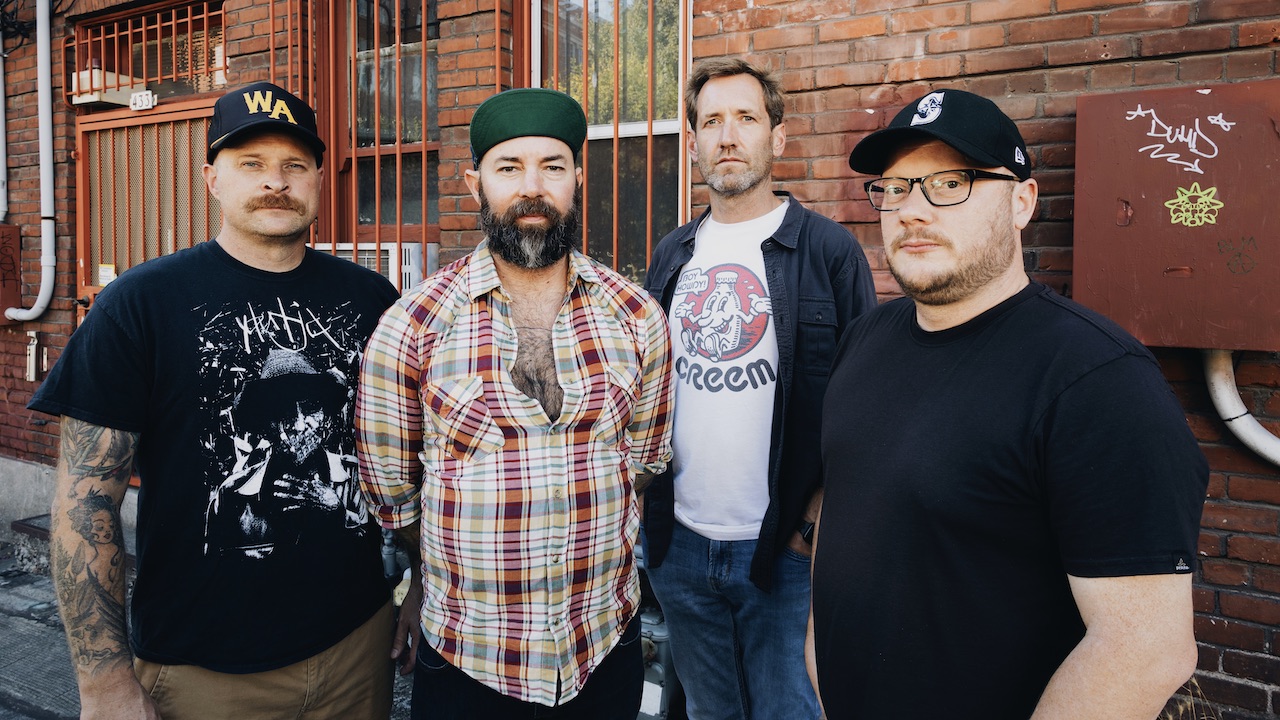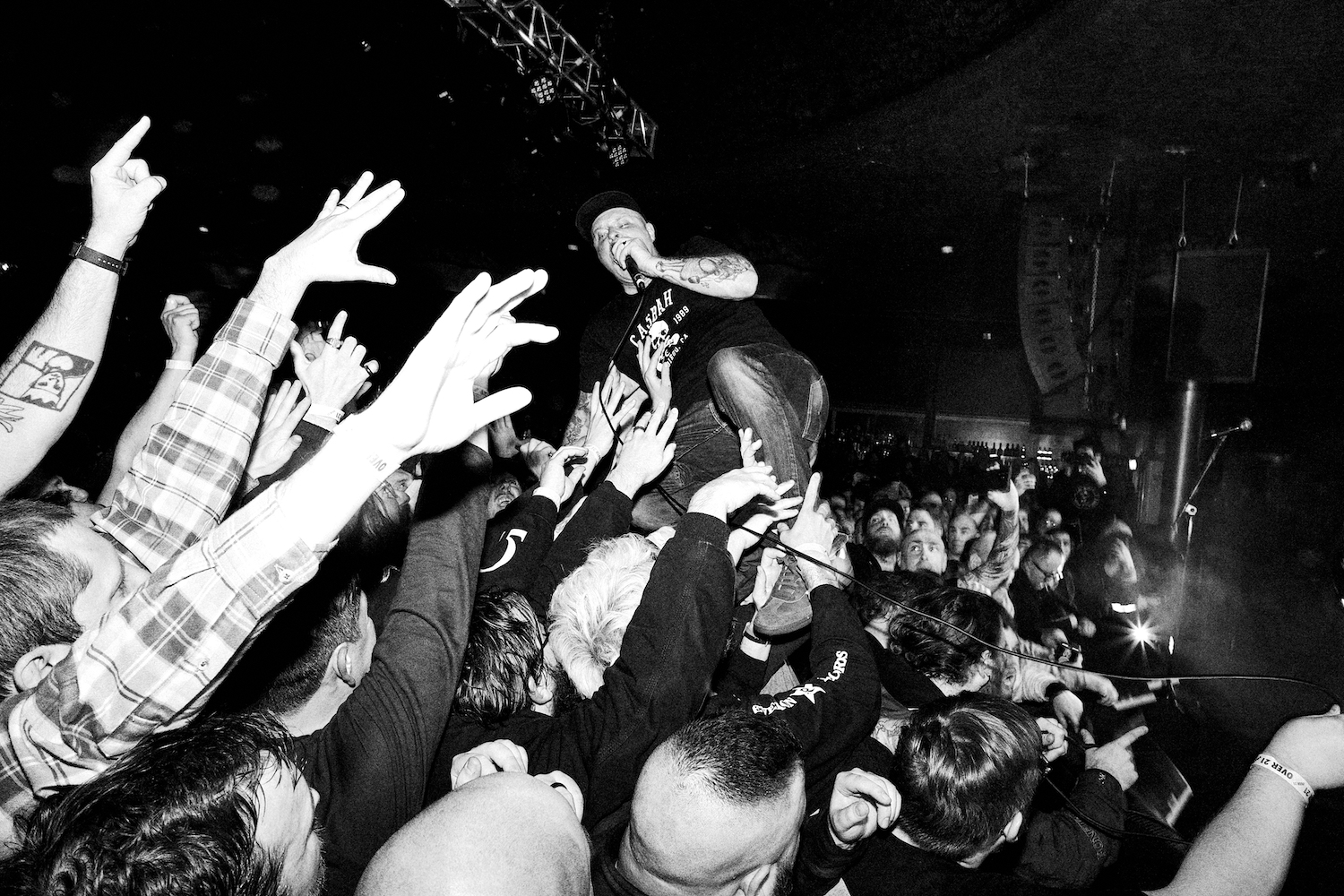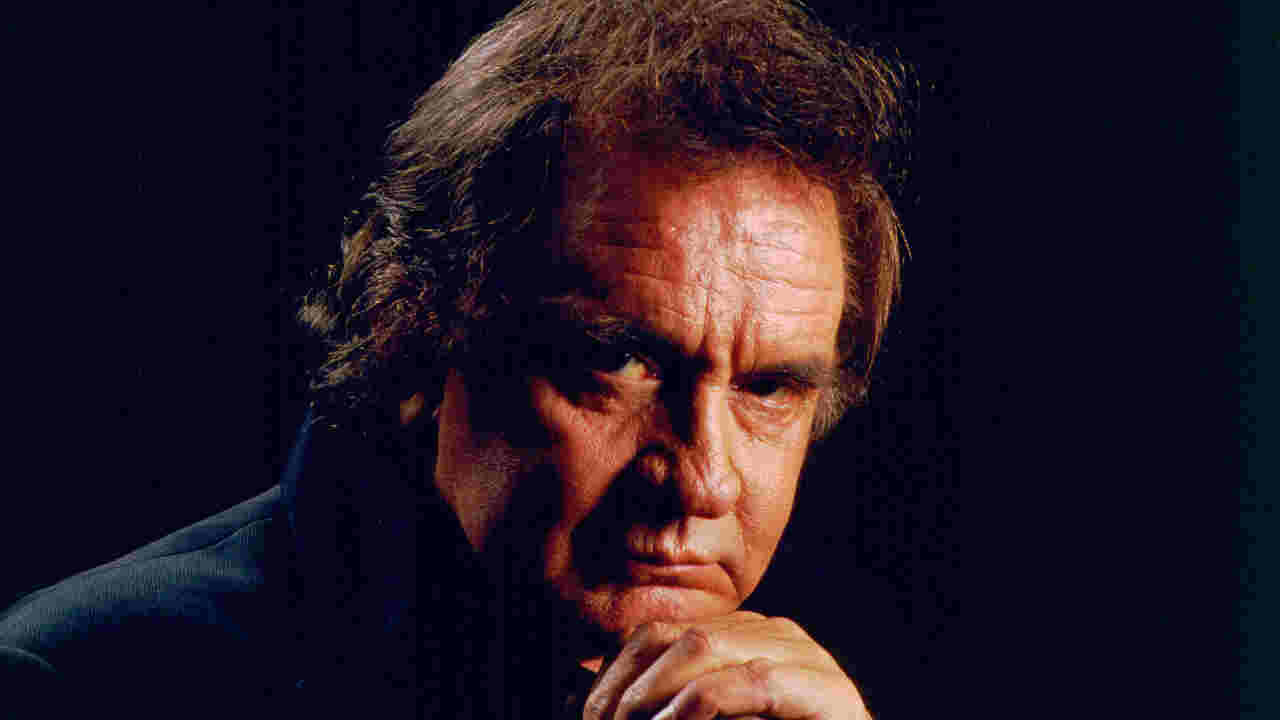"It's kinda insane that we made this thing that people are still talking about now": Botch on becoming hardcore legends and reuniting after 20 years for one last tour
Botch changed the face of hardcore punk: now they're back to get their flowers on their farewell/reunion tour

Some bands, it seems, can only be spoken about in hushed tones and reverential terms. Normally these are the artists who influenced a genre to the point where they basically invented a new one, or whose creative lifespan was so short but memorable that they left people wondering if there was any hope of a revival.
Botch did both of these things. A quartet of self-described "misfits" from Tacoma, Washington, with just two albums and three EPs they unintentionally changed the shape of punk to come for the next two decades.
After they split in 2002, peers such as Converge and The Dillinger Escape Plan went on to dominate 21st century underground hardcore hit lists, but Botch were never forgotten. Mainly because, once you've heard it, their music becomes strangely unforgettable. Awash with odd time signatures and arriving in multiple parts, these are songs that seem to scramble up the walls and across the ceiling of any room they're played in, coaxed into a form you half-recognise with surreal songs titles and the band's trademark oddball humour.
Post-split, band members branched out into forming new acts – from the leftfield, lighter fare of Minus the Bear and Roy to the more familiar gnarl of Narrows and These Arms Are Snakes. But these acts' antecedent was never allowed to be forgotten, to the point where, when Botch re-emerged with a new song One Twenty Two in 2022, to mark a reissue of their career-high We Are the Romans album, a deafening buzz quickly followed.
Now we are in the midst of the band's first ever reunion tour, which will also be their last ever reunion tour. Before it passes through the UK and Europe in March 2024, Louder sat down with vocalist Dave Verellen and guitarist Dave Knudson to ask them to take stock of their legacy and reflect on how they've changed, while the songs (thankfully) remain the same.

You formed Botch in high school. How did being in a band that young affect your world view?
Dave Knudson: "There's this thing that happens when you're writing music where there's this insane rush of energy when you're creating something. The spark and the imagination of it all is so thrilling that I think that led me down the road of wanting to continue doing that for the rest of my life. When we started, it was very humble beginnings… It was just purely coincidental that we all found each other in high school and were able to make this thing that is kind of insane people are still talking about now."
Dave Verellen: "I felt like I had a lot to learn. I was challenged in the arena of writing lyrics and trying to make vocals sound like something that people would want to listen to. [Laughs] That ranged from trying to sing in the early days to deciding to be a screaming-type vocalist. Even though it was super rough and there was a lot of variety in terms of our performances and feedback, it helped us create our style."
DK: The way we butted heads when we were writing something, we wanted to challenge each other to become better. I think that's what made the songs really good, as we were kind of trying to outdo each other. Then we'd meet together to take it to the next level that we couldn't do independently. I think that was like a whole thing with the entirety of the band and the writing process.
Part of the reason Botch's music is still celebrated today is because it's so unique. Was it tough to win people over with that?
DK: We were all kind of like misfits in high school. There were definitely the cool music kids, but we were not those kids. It took a while for people in the Seattle or Tacoma or whatever hardcore scene to take us seriously.
DV: "I remember this one show where there was a group that made a point to try to ignore us when we played. There was one dude who was like, 'Hey, everybody, turn your back while these guys play.' That's pretty challenging to deal with as a young person who's trying to be brave and put yourself out there for people.
"The cool thing that came from that was, we wanted to leave. We wanted to play out in other areas, because then there wasn't that social context. So, we were trying to play Oregon or Canada, or places where we weren't around those people. That pushed Botch into being a touring band earlier than a lot of bands would have decided to try to go on the road."
The latest news, features and interviews direct to your inbox, from the global home of alternative music.
Despite Botch's determination to forge their own path, the reality of playing such challenging music eventually took its toll on the young quartet. Before disbanding in 2002, they played a final show at the Showbox in Seattle, where the band will return for two nights to conclude this year's farewell tour.
Back in 2002, Botch's final release, An Anthology of Dead Ends, seemingly poked fun at the band's inability to consistently recapture the magic they'd felt when concocting their epochal 1999 album We Are the Romans. Since reuniting they've most notably plugged themselves into the internet with the release of One Twenty Two, finally allowing them to gauge their popularity with a global audience in real-time.
There's been plenty of speculation about what might've happened to Botch if you hadn't broken up. How often did you find yourselves thinking about it?
DV: "I'm sure Dave and Brian (Cook, bass) were super busy with music, so it was less of a thing. [Knudson formed Minus the Bear after Botch's demise, while Cook went on to found These Arms Are Snakes]. But for me and Tim (Latona, drums), who were doing other stuff that was not music-related, I'm sure we wondered more, Man, I wonder where would we have ended up?"
DK: "I definitely thought about it, even though, well, I don't know if I'm ultimately to blame… [Laughs] Certainly I'd see Dillinger going on a cool tour and be, like, 'Oh, man, if we'd stuck together, what would've happened?' But I think it came to an end at the appropriate time. Anthology… is a great EP, but getting those songs to that place was really tough. With …Romans we said everything we wanted to say in a really great way. No one wanted to release anything that was below that standard. I'd rather go out on top then end up writing a record that we weren't proud of, or that kind of tarnished what had made us look so great in the first place."
When did you start to become aware of Botch influencing so many other bands?
DK: "Matt Bayles [the renowned producer and musician who was later Knudson's Minus the Bear bandmate] would comment that he would get tonnes of demos from people wanting to work with him and say, 'Man, these guys really love Botch…' [Laughs] I don't hold it against anybody if they're Botch fans and they write a Botch-y riff. I mean, I'll take that as a compliment. Why not?"
How has the advent of streaming services affected your legacy? Has it taught you anything about Botch that you didn't already know?
DK: I don't really pay attention to the streaming services. I mean, we have looked at Spotify to wonder what songs we should play in our setlist. We knew the ones that we wanted to play, but we were, like, 'I wonder if there are any outliers?' It’s awesome to see that Afghamistam [sic] is one of the top-streamed songs. Not that it was surprising to me, but it's a totally different track that we did."
DV: I remember at practise one day when Tim was like, 'Dude, look at all these countries where people are listening to our music', because he could look around the world and see where people were listening to Botch. That was pretty interesting.
When people kept saying One Twenty Two broke the internet, I don't even know if I know what that means…
Dave Verellen
Were you surprised by the reception that One Twenty Two received?
DV: "We were blown away. I had zero concept or understanding of how people thought about the band 20 years later.
"When people kept saying it broke the internet, I don't even know if I know what that means… [Laughs] Personally, all of a sudden, my phone was going so crazy that my wife was like, 'What the hell?' I got so many messages and I know Dave and Brian got so many messages that we felt really good. It was like a warm hug that could have been somebody just being, like, 'Are you fucking kidding me?' People understood we're still a genuine band trying to take advantage of the opportunity."
Now very much in hardcore's veteran bracket, Botch's current time on tour is a world away from some of the more colourful nights on the road that marked their youth. However, their recent gigs have unearthed some unlikely fans and underlined their conviction about why they do this.
Did you have any weird or wonderful encounters on tour during Botch's younger years?
DV: "There was one gig in Hawaii where there was a guy who was threatening to bring people to break up the show. We were playing in a place where it was kind of illegal. We were kind of stealing power and the promoter never came to unlock the doors, so we were, like, Fuck that, we're gonna have our show anyway! There were a couple of regrettable things that went into that interaction… We were just glad to take our cues and understand that it was time to leave!"
DK: "We were going into like Slovenia or somewhere and at the border the guy asked, 'What are you Americans doing here?' Our driver told him we were in a band and the border patrol guard was, like, 'Let's see, where are your tubas?' We had to explain that we're not that kind of band."
Have you met any unlikely fans at your shows since you reunited?
DV: When Boygenius came to our show, that was fuckin' awesome!
DK: "Julien [Baker] came backstage at the New York show. And then I think she and Lucy [Ducas] came to the LA show. It's funny when you meet people like that. Kimbra, apparently, is an enormous Botch fan and so she came to the New York show. It's cool that the music has reached all these different people. [Laughs] It's like, 'Oh, hey, I liked you 20 years ago.'

This year's shows are being billed as Botch's final tour. Is that still accurate?
DK: "Yeah. We made a conscious effort at the beginning of this to make sure this was for a finite period. You see a lot of bands come back for reunion tours, you think that's it, but then a couple months later, it's like, 'Now we're doing this and now we're doing that and now we're doing these festivals…' This is meant to be in this window of time, then we'll put the band back to bed and let its legacy carry on.
Do you measure the success of Botch differently now?
DV: "I feel like we measure it the same. It's all self-satisfaction stuff. We got into a headspace where a lot of exterior factors didn't matter, although we're really, really appreciative and stoked about how everything has gone. But at the end of the day, it's like, 'Are we satisfied with what we're doing?' and put ourselves first in that regard."
DK: "It's been awesome to appreciate the fact that we made this music that people still love. But yeah, Dave's right. I think we always did this for ourselves and the fact that other people love it is an added bonus. It's been great to reconnect all four of us, be able to go on tour and have some closure in a proper way. And to be grateful for the chance that we had to do this 20 years ago, and that we have a chance to do it right now. So perfect."
Botch's farewell tour begins its UK leg on 21 March. Book tickets here.
A long-time contributor to Kerrang! and feature writer for Noisey, Fightland and more, punk rock lifer Alistair Lawrence wrote the acclaimed Abbey Road: The Best Studio in the World in 2012. Hopefully Ridley Scott will forgive him for accidentally blanking him in one of the studio’s hallways, should they ever meet again.
